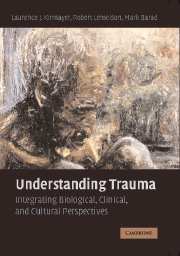Book contents
- Frontmatter
- Contents
- List of Figures
- List of Tables
- List of Contributors
- Foreword by Robert Jay Lifton
- Preface
- List of Abbreviations
- Introduction: Inscribing Trauma in Culture, Brain, and Body
- SECTION I NEUROBIOLOGICAL PERSPECTIVES ON TRAUMA
- SECTION II CLINICAL PERSPECTIVES ON TRAUMA
- SECTION III CULTURAL PERSPECTIVES ON TRAUMA
- Epilogue: Trauma and the Vicissitudes of Interdisciplinary Integration
- Glossary
- Index
- References
Introduction: Inscribing Trauma in Culture, Brain, and Body
Published online by Cambridge University Press: 27 July 2009
- Frontmatter
- Contents
- List of Figures
- List of Tables
- List of Contributors
- Foreword by Robert Jay Lifton
- Preface
- List of Abbreviations
- Introduction: Inscribing Trauma in Culture, Brain, and Body
- SECTION I NEUROBIOLOGICAL PERSPECTIVES ON TRAUMA
- SECTION II CLINICAL PERSPECTIVES ON TRAUMA
- SECTION III CULTURAL PERSPECTIVES ON TRAUMA
- Epilogue: Trauma and the Vicissitudes of Interdisciplinary Integration
- Glossary
- Index
- References
Summary
INTRODUCTION
We live in a world torn and scarred by violence. Globalization has increased the speed and scale of conflicts and catastrophes, but violence has been integral to the human condition from our earliest origins. We should expect, therefore, to find its traces in the design of our brains and bodies no less than in the weave of our communities.
Trauma has become a keyword through which clinicians and scholars from many disciplines approach the experience of violence and its aftermath. The metaphor of trauma draws attention to the ways that extremes of violence break bodies and minds, leaving indelible marks even after healing and recovery. But the notion of trauma has been extended to cover a vast array of situations of extremity and equally varied individual and collective responses. Trauma can be seen at once as a sociopolitical event, a psychophysiological process, a physical and emotional experience, and a narrative theme in explanations of individual and social suffering.
Within psychiatry, much recent work on the psychological impact of trauma has focused on the diagnostic construct of posttraumatic stress disorder (PTSD). The diagnostic criteria for PTSD include a history of exposure to a traumatic event and symptoms from each of three groups: intrusive recollections of the trauma event, avoidance of reminders of the event and emotional numbing, and hyperarousal (American Psychiatric Association [APA], 2000).
Information
- Type
- Chapter
- Information
- Understanding TraumaIntegrating Biological, Clinical, and Cultural Perspectives, pp. 1 - 20Publisher: Cambridge University PressPrint publication year: 2007
References
Accessibility standard: Unknown
Why this information is here
This section outlines the accessibility features of this content - including support for screen readers, full keyboard navigation and high-contrast display options. This may not be relevant for you.Accessibility Information
- 14
- Cited by
